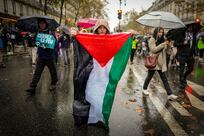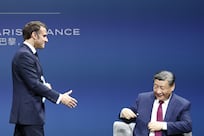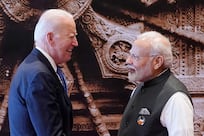French politician Jean Marie Le Pen seldom expressed disappointment when his far-right National Front Party failed to win elections. By gaining even a small segment of the electorate, Mr Le Pen believed that his party was slowly expanding the boundaries of the acceptable in French political discourse. Extreme ideas slowly became more commonplace and carried more weight in deciding the political direction of the country. The same dynamic is at play in Israel, and the current election campaign is the perfect example.
After years of listless peace talks with the Palestinians along with the entrenchment of Israel’s occupation through continued settlement-building, mainstream political parties appear united in maintaining – and even defending – the status quo. The Israeli right wing continues to deliver verbose solutions to the conflict, ranging from the forced expulsion of West Bank Palestinians to encouraging Palestinian citizens of Israel to leave, as foreign minister Avigdor Lieberman has recently proposed.
What is remarkable in this election, however, is that traditionally left-of-centre parties have removed the facade of advocating a genuine peace initiative with Palestinians and are advocating a more explicitly hawkish Israeli foreign policy. As Mr Le Pen attempted in France, the boundaries of acceptable Israeli political discourse have been redefined.
To challenge the dominance of Israeli prime minister Benjamin Netanyahu, former justice minister Tzipi Livni has teamed up with Labour party leader Isaac Herzog to form a new left-of-centre party called the Zionist Camp.
The idea behind this joining of forces is simple – to present a nationalist but left-of-centre opposition to Mr Netanyahu’s rule. This would reaffirm to Israel’s supporters in the West that Israeli society and its leaders are still able and willing to reach an equitable two-state solution to the conflict with the Palestinians. Indeed, many of Israel’s supporters in the United States have pointed to the new party to defuse the growing problem posed by Mr Netanyahu’s aggressive entrenchment of the status quo, which is specifically predicated on continuing occupation and domination of the West Bank.
A closer look at what the Zionist Camp is advocating though reflects how far the political discourse has shifted to the right and the simple fact that Israeli politicians now campaign more on a ticket of war than peace. For example, both Ms Livni and Mr Herzog have publicly ridiculed Mr Netanyahu for reaching a ceasefire with Hamas to end last summer’s conflict in Gaza. For Ms Livni, the only way to deal with Hamas is to “use military force against terror ... this is instead of Netanyahu’s policy to come to an agreement with Hamas”.
Additionally, the Zionist Camp decided last week to support a controversial petition to disqualify Palestinian member of parliament Haneen Zoabi of the Balad Party from serving in the next parliament. International observers have warned that barring Ms Zoabi would have a grave effect on the health of Israel’s democratic institutions.
More often than not, election campaigns are denoted by hopeful calls for social change, a stronger economy and a safer society. This is not the case in the current Israeli election. In fact, the only thing that the major parties can agree upon is that the solution to the problem of Hamas is another war in Gaza. This agreement underlines that Israel, as a country and society, remains guided by issues of war, militarism and security. Peaceful coexistence doesn’t enter into the calculation. Those who run on platforms of peace, such as the left-wing Mertz Party, have trouble even clearing the electoral threshold.
As the opinion polls stand at the moment, we will see a new Israeli parliament run by Mr Netanyahu or a coalition between his right-wing Likud party and the Zionist Camp. Regardless of the specifics, the new parliament will have a clear mandate for continued fighting and occupation.
This election highlights the degree to which Israeli intransigence over ending the occupation and making the concessions needed for a peace agreement have taken hold of the majority. If few liberal voices are able to achieve electoral success, it will be confirmation that the rightist colonial rhetoric of the early settler movement has become mainstream. It will also confirm that Israel is neither able nor willing to change the status quo by itself. It should be a warning for all who want to see an equitable solution to the conflict that stands at the heart of the Middle East.
jdana@thenational.ae
On Twitter: @ibnezra





